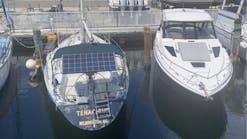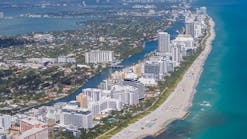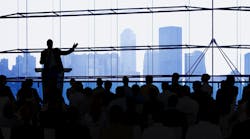Last week, I attended two summits: the first Green Globes Summit, held in Atlanta, and Florida Atlantic University's third Sea-Level Rise Summit, held in Fort Lauderdale. What the events had in common, surprisingly, was a call to participants not to use "green shame" or "green blame" to promote their individual (or corporate) points of view.
Organized by the non-profit Green Building Initiative (GBI), which administers the Green Globes building rating system, the Green Globes Summit was attended by GBI staff, Green Globes Assessors (engineers and architects certified by the GBI to conduct third-party verification of projects), and Green Globes Professionals (representing the client side of the process). Speakers included senior GBI staff members, with updates on issues such as the ANSI/GBI New Construction standard, GBI online tools, and the exponential growth in Green Globes registrations and certifications over the past year. The formal program included presentations on best practices and case studies from assessors and users. There also were breakout sessions, during which practitioners were able to provide feedback to the GBI’s staff (and its board of directors). One of the underlying messages repeatedly emphasized by GBI Executive Director Vicki Worden was the need to promote green-building practices regardless of the "product" used. She made it clear that, although the GBI pays her salary, her real job is to advance implementation of sustainability in the built environment—whether with Green Globes or another vehicle—and that competing organizations must take the high road in their discussions with potential clients and in the training of professional practitioners.
With the theme "Connected Futures From Alaska to Florida," the Sea-Level Rise Summit focused more on adaptation strategies, such as higher seawalls, building on stilts, and the hardening of dunes, than mitigation, although the importance of carbon-dioxide-reduction strategies, such as the energy-efficient buildings promoted by Green Globes, LEED, and others—was recognized. As has been noted in literature, even if carbon emissions were reduced to zero today, the Earth’s temperature would continue to rise, and ice would continue to melt for many years, so making our coastal communities more resilient through adaptation is an immediate short-term priority. In the past, when I've posted about climate change and sea-level rise, I've received comments from professionals in our industry denying the validity of the voluminous scientific evidence supporting conclusions accepted by 97 percent of the world's climate scientists. After witnessing first-hand the effects of storm surge and king tides here in South Florida and learning about the effects of sea-level rise in high latitudes, I'm more committed than ever to the need for communities—particularly the most vulnerable coastal communities—to become more resilient.
The Sea-Level Rise Summit primarily was an academic conference and intended to be non-political. There were, however, several (mostly humorous) references to last year's headlines alleging that Florida's governor had ordered certain state employees not to use the terms "climate change" or "global warming." The good news is that we heard reports suggesting both sides of the aisle, at all levels of government, are recognizing climate change as scientific reality and not just a political issue. Like the Green Globes Summit, there was much discussion about the need to promote our positions without disparaging others’.
In the case of green building, we pledged not to use "green blame" to differentiate the various green-building rating systems and, on the larger issue of climate change, not to attack opponents by playing the "green shame" card.










